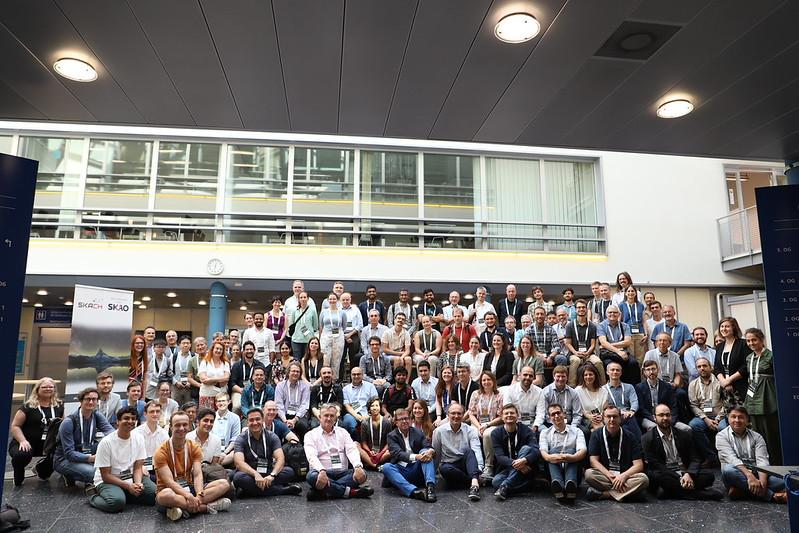Switzerland
At a glance
- The SKA Switzerland Consortium (SKACH) manages Switzerland's contributions to the SKAO
- About 100 team members are organized across five programs: Science, Data Science and Simulations, Instrumentation, Computing Platforms and Infrastructure, and Outreach.
- Members actively participate in several precursor instruments including MeerKAT, MWA, and HIRAX.
- Swiss industry has been awarded three SKAO contracts with a value of 5.37 million Euros.
National involvement
SKACH manages Switzerland's contributions to the SKAO with support from the State Secretariat of Science, Innovation, Research, and Education (SERI). The Consortium’s nine institutional members: Fachhochschule Nordwestschweiz (FHNW), Universität Zürich (UZH), Eidgenössische Technische Hochschule Zürich (ETHZ), École Polytechnique Fédérale de Lausanne (EPFL), Zürcher Hochschule für Angewandte Wissenschaften (ZHAW), Universität Basel (UniBas), Université de Genève (UniGE), Haute École spécialisée de Suisse Occidentale (HES-SO), Centro Svizzero di Calcolo Scientifico (CSCS).
Led by its Board of Directors, SKACH has achieved significant levels of collaboration between disciplines and institutions. Internationally, members actively participate in SKAO Regional Centre (SRC) and science working groups, and in several precursor instruments. SKACH has made significant contributions to international radio astronomy by developing advanced imaging, analysis and simulation tools, used by MeerKAT, MWA and LOFAR. Switzerland was the first to achieve a V0.1 SRC, which will be part of the supercomputing network responsible for managing and analyzing SKAO’s large datasets.
Industrial participation
Switzerland has secured industrial contracts for software integration as well as providing state-of-the-art atomic clocks and engineering parts. The SKAO has purchased four units of the iM3000, SAFRAN Active Hydrogen MASER –integrating intelligent functionality with a field lifetime of more than 30 years. Made by the Neuchâtel division of Safran Electronics and Defense, one Swiss MASER will be deployed in South Africa and three will be shipped to Australia. In 2022, the Swiss company Cosylab joined other developers working on the SKA telescopes’ Observatory Management Control software. The company’s key focus is the development of the Central Signal Processor Local Monitoring and Control component, crucial for processing digitized data and providing astronomical outputs. And MECHA AG, a mechanical engineering company based in Bern is working on a unique ‘horn’ project for the SKAO. The company is producing 2-thousand fine machined mechanical parts required to build the 133 SKA Mid Band horns.

Science interests
The Swiss scientific community is driven by a wide range of astrophysics research including: cosmology, the cosmic dawn and the epoch of reionisation, large scale structures, galaxy evolution, gravitational waves, cosmic magnetic fields, tests of gravity, solar physics and gravitational wave research. This includes HI galaxy studies with MeerKAT, and the epoch of reionisation through Switzerland's institutional partnership with the MWA consortium. Observational efforts are complemented by world-leading simulations of cosmological structures and astrophysical processes at all scales. SKACH has grown with a strong computing component and synergies between astrophysicists and data scientists are spawning novel approaches for interferometric imaging, RFI excision and object classification, with computer scientists contributing cutting-edge solutions in exa-scale and green computing, needed to handle the large dataset of the SKAO. The SKACH community participates in seven SKAO Science Working Groups, with SKACH researchers having recently led those for cosmology, cradle of life, extragalactic continuum and solar, heliospheric and ionospheric physics. SKACH researchers have led more than 26 peer-reviewed publications in the last 4 years.
Wider impact
Investing in the future, SKACH member institutions host more than 10 PhD students and, in 2024, welcomed 80 young career researchers and experts in the field to the inaugural Cosmology in the Alps. Since 2016, the annual Swiss SKA Days has brought together the entire Swiss team and visitors from other SKA partner countries. In March 2025 the SKACH community organized a science day in Zurich prior to the SKAO Council. Switzerland has invested heavily in an SKAO Regional Centre (CHSRC) which can perform to 14 TFlops with 400 TB of storage at CSCS via the Gornergrat kubernetes cluster(s). SKACH data scientists earned top positions in the SKAO Science Data Challenge 3b which asked participants to infer the reionization properties of the Universe. SKACH delivers impactful outreach and public engagement activities, regularly attending large festivals in Switzerland focused on science and STEM – directly reaching tens of thousands of people. From January 2025, SKACH broadcast the first season of its French language podcast series Radio Cosmos, already downloaded more than 1500 times.




